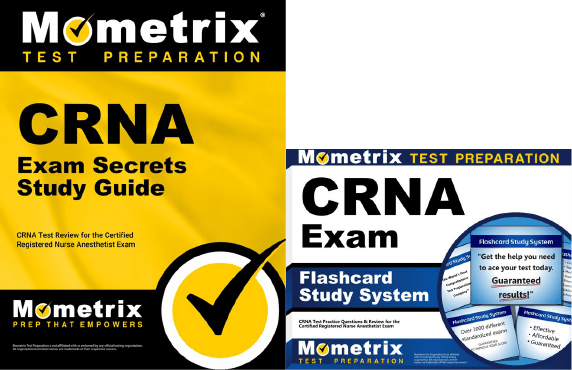If you need help studying for the National Certification Examination (NCE) to become a Certified Registered Nurse Anesthetist (CRNA) or just want some more information about what the test is like, you’ve come to the right place.
Click below to take a free CRNA practice test!
Exam Eligibility
Before you can register to take the exam, you need to have a current RN license, and you’ll need to have completed an accredited anesthesia nursing program within the past two years.
If you meet these requirements, you’re set to begin the registration process!
What’s on the Exam?
First, let’s talk about the questions on the exam. There are between 100 and 170 questions in total, but 30 of the questions will not count toward your score. Why is that?
The 30 unscored questions on the exam are called “pretest” questions. These are added to the exam to determine if they’re good enough questions to add to future versions of the test.
The trick is that you won’t have any way of knowing which questions are scored and which ones are pretest. They will appear just like the scored questions throughout the test.
While some of the questions are the usual multiple-choice format, there are a handful of other question formats on the exam:
- Multiple Correct Response: You’ll be given 4-8 answer choices, and more than one choice will be correct. You’ll need to select all of the correct options to get the question right.
- Calculation: You’ll be asked to calculate a number and input the number as a numeral (3) not a word (three).
- Drag and Drop: You’ll be given items to drag to specific targets and/or place in a specific order.
- Hotspot: You’ll need to click a specific area of a given image.
- Graphics: You’ll be shown an image or video as part of the question.
The time limit for the exam is 3 hours. There aren’t any scheduled breaks, but you’re free to take restroom breaks as needed.
Let’s take a closer look at the different sections of the exam.
1. BASIC SCIENCES
20% of the exam
- Anatomy and physiology
- Pathophysiology
- Pharmacology
- Applied chemistry, biochemistry, physics, and mathematics
2. EQUIPMENT, INSTRUMENTATION, AND TECHNOLOGY
20% of the exam
- Anesthetic delivery systems
- Airway equipment
- Monitoring devices
- Patient warming equipment
- Infusion devices
- Imaging
- Imaging safety
3. GENERAL PRINCIPLES OF ANESTHESIA
35% of the exam
- Ethical considerations
- Legal issues
- Safety and wellness
- Preoperative assessment and preparation of the patient
- Fluid volume assessment and management
- Positioning
- Utilization and interpretation of testing data
- Airway management
- Local/regional anesthetics
- Light, moderate, and deep sedation
- Pain
- Total intravenous anesthesia
- Enhanced recovery after surgery
- Hypotensive technique and risks
- Post-anesthesia care
- Respiratory therapy
- Intraoperative fire safety
5. ANESTHESIA FOR SURGICAL PROCEDURES AND SPECIAL POPULATIONS
25% of the exam
- Surgical and diagnostic anesthesia
- Anesthesia for special populations
Computer-Adaptive Testing (CAT)
The CRNA (NCE) exam is a computer-adaptive test. Basically, this means that the questions will become harder or easier as you go through the exam, based on how well you’re answering the questions.
For example, say you answered the first question correctly. The first question is of medium difficulty, so the next question will be slightly harder. Then, let’s say you answered the second question incorrectly. The next question would then be a medium question.
How to Register
Once you’ve ensured that you meet all of the eligibility requirements, you can register for the exam.
To get started, you’ll need to submit an application to the NBCRNA. The application will ask you for your contact information and any documentation to prove your eligibility (among other things). When you submit the application, you’ll also need to submit the exam fee, which is $295.
Once your application is approved, you’ll be given information on how to register for a testing appointment.
Exam Scores
The CRNA (NCE) exam is scored using a scaled scoring method. Here’s how it works:
A passing score is a scaled score of at least 450.
The reason your raw score is converted to a scaled score is because everyone who takes the exam is given a slightly different set of questions. Since everyone has a different arrangement of questions, and because some questions are harder than others, converting your raw score to a scaled score ensures a more even playing field.
Retaking the Exam
If you didn’t get a passing score on your first try, that’s okay! You can retake the test after a 90-day waiting period.
Keep in mind that you will have to pay the full testing fee every time you retake the test.
FAQs
What is a CRNA?
A certified registered nurse anesthetist (CRNA) is an advanced practice registered nurse (APRN) who administer anesthesia for all types of surgical cases.
How long is CRNA school?
Most CRNA programs last from 14 to 36 months.
How much does a CRNA make?
According to BLS, the average salary for a CRNA is $214,200.
How many questions are on the CRNA exam?
The NBCRNA NCE exam contains between 100 and 170 questions.
What is the time limit for the CRNA exam?
The NBCRNA NCE exam is timed at 3 hours.
What is the passing score for the CRNA exam?
You’ll have to get a final score of at least 450 to pass the NBCRNA NCE exam.
How much does the CRNA exam cost?
The NBCRNA NCE exam fee is 295.



 CRNA Study Guide
CRNA Study Guide CRNA Flashcards
CRNA Flashcards
